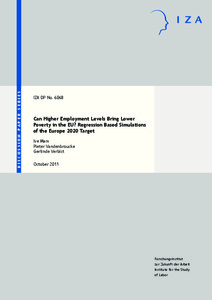Can higher employment levels bring lower poverty in the EU? Regression based stimulations of the Europe 2020 target

Marx, Ive ; Vandenbroucke, Pieter ; Verbist, Gerlinde
Institute of Labor Economics, Bonn
IZA - Bonn
2011
35 p.
employment ; income distribution ; poverty ; statistics ; Europe 2020
Discussion Paper Series
6068
Employment
English
Bibliogr.
"At the European level and in most EU member states, higher employment levels are seen as key to better poverty outcomes. But what can we expect the actual impact to be? Up until now shift-share analysis has been used to estimate the impact of rising employment on relative income poverty. This method has serious limitations. We propose a more sophisticated simulation model that builds on regression based estimates of employment probabilities and wages. We use this model to estimate the impact on relative income poverty of moving towards the Europe 2020 target of 75 percent of the working aged population in work. Two sensitivity checks are included: giving priority in job allocation to jobless households and imputing low instead of estimated wages. This paper shows that employment growth does not necessarily result in lower relative poverty shares, a result that is largely consistent with observed outcomes over the past decade."
Digital
The ETUI is co-funded by the European Union. Views and opinions expressed are however those of the author(s) only and do not necessarily reflect those of the European Union or the ETUI.